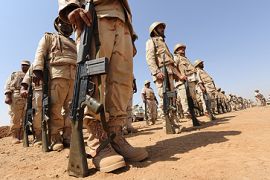Yemen rebels claim territorial gain
Houthi fighters say they have seized more territory on the border with Saudi Arabia.

Saudi worries
Saudi forces have also in recent days launched military strikes against the Houthis after the fighters killed a Saudi soldier in a cross-border raid last week.
Saudi officials said on Sunday that their forces had regained control of Jabal Dukhan, which was seized by the Houthi fighters.
| In depth | |||||||||
|
Saudi Arabia has become increasingly anxious about instability in Yemen, which is facing opposition from the Shia population in the north, separatist sentiment in the south and a growing threat from resurgent al-Qaeda fighters.
The 1,500km border between Yemen and Saudi Arabia is a security worry for the kingdom, which is building a high-tech border fence to prevent infiltration.
In the recent weeks, Houthi fighters have accused Saudi Arabia of allowing Yemeni forces to use its territory as a base to launch attacks against them and threatened to respond.
Al Jazeera’s Hashem Ahelbarra, reporting from the Yemeni capital, Sana’a, said: “We are amid a campaign and a propaganda war with both sides saying they have made huge advances.
“Saudi Arabia is a key player in Yemen, it has loyalty of tribal leaders, politicians and religious leaders here.
“Saudi Arabia prides itself by saying they are the protectors of Sunni Islam and while 80 per cent of Yemen’s population is Sunni, they say it is their moral obligation to protect Sunnis everywhere in the world.”
Saudi Arabia also has concerns that the Houthis are being used by Iran to fight a proxy war against it.
Houthis first took up arms against the government of Ali Abdullah Saleh, Yemen’s president, in 2004, citing political, economic and religious marginalisation by the Saudi and Western-backed administration.
The conflict intensified in August when Yemen’s army launched Operation Scorched Earth.
Aid groups, which have been given limited access to the northern provinces, say at least 150,000 people have fled their homes since 2004.
